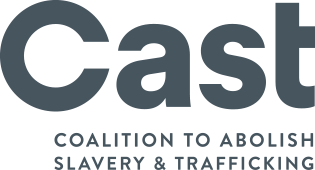
The City of West Hollywood recognizes National Slavery and Human Trafficking Prevention Month in January. Advocates, organizations, and individuals will unite this month to raise awareness about the issue of human trafficking.
The lanterns on Santa Monica Boulevard between N. Robertson Boulevard and Hancock Avenue will be blue through Tuesday, January 19, 2021. Blue is the international color for human trafficking awareness.
National Human Trafficking Awareness Day is observed on Monday, January 11, 2021. On this day, the City of West Hollywood will participate in raising awareness about #WearBlueDay, an initiative of the Department of Homeland Security DHS Blue Campaign, a national public awareness campaign that encourages community members to help spread the word about human trafficking by taking photos of themselves, friends, family, and colleagues wearing blue clothing and sharing them on social media using hashtag #WearBlueDay.
The DHS Blue Campaign is designed to educate the public, law enforcement, and other industry partners to recognize the indicators of human trafficking and how to appropriately respond to possible cases. The campaign leverages partnerships with the private sector, non-governmental organizations, law enforcement, and state/local authorities to maximize national public engagement on anti-human trafficking efforts for the prevention of human trafficking and protection of exploited persons. For more information about the DHS Blue Campaign and how to participate go to www.dhs.gov/blue-campaign.
Department of Homeland Security reports that human trafficking is: “modern-day slavery and involves the use of force, fraud, or coercion to obtain some type of labor or commercial sex act.” Victims of human trafficking are of all genders, ages, races, countries, and socioeconomic statuses. While human trafficking can happen to anyone, people who are already in vulnerable situations — including migrants and refugees fleeing conflict or disaster, homeless LGBT youth, women and girls, and children in poverty — are preyed upon and may be more likely to be targeted by traffickers. The different kinds of human trafficking include sex trafficking, forced labor, and domestic servitude. Any person under the age of 18 involved in a commercial sex act is considered a victim of human trafficking.
The Polaris Project, which publishes data based on calls, text messages, webforms, emails and webchats with the National Human Trafficking Hotline, states over 25 million people are trafficked worldwide, and California is one of the largest sites of human trafficking in the United States.
The National Human Trafficking Hotline has seen a 40 percent increase in emergency calls during the COVID-19 pandemic. The Coalition to Abolish Slavery and Trafficking (CAST), a Los Angeles-based human rights organization and one of the nation’s largest provider of services to survivors, has seen 185 percent increased cases during the pandemic, compared to last year. Additionally, 100 percent of CAST’s most urgent trafficking cases have been homeless people who were trafficked.
If you are a victim of human trafficking or if you are aware of a trafficking situation, there are resources to help:
- The National Human Trafficking Hotline connects victims and survivors of sex and labor trafficking with services and support to get help and stay safe. The hotline also receives tips about potential situations of sex and labor trafficking and facilitates reporting that information to the appropriate authorities in certain cases. Toll-free phone and SMS text lines and live online chat function are available 24 hours a day, 7 days a week, 365 days. To contact the hotline, call (888) 373-7888 or text HELP or INFO to BeFree or 233733. Deaf or hard of hearing or speech-impaired people can contact the hotline by dialing 711.
- The Coalition to Abolish Slavery and Trafficking (CAST) helps people who have been in forced prostitution, forced labor, and slave-like conditions by providing legal and social services. To request services or report tips regarding potential human trafficking cases, contact the toll-free, 24/7 hotline at (888) Key-2-FREE or (888) 539-2373.
- Journey Out provides comprehensive services and support to help victims of commercial sexual exploitation and sex trafficking. For assistance call (818) 988-4970 or email info@journeyout.org.
For more information about National Slavery and Human Trafficking Prevention Month, please contact the City of West Hollywood’s Community Events Coordinator Larissa Fooks at (323) 848-6413 or lfooks@weho.org.
